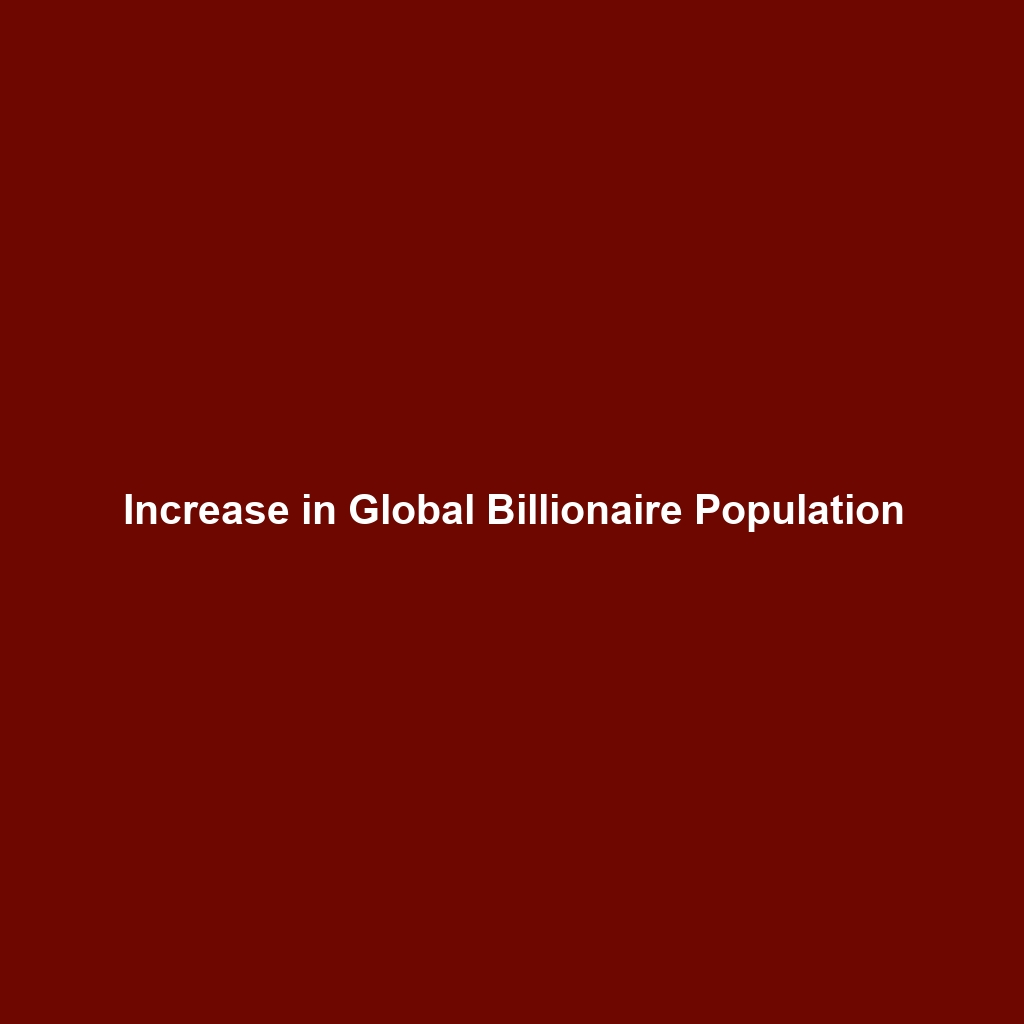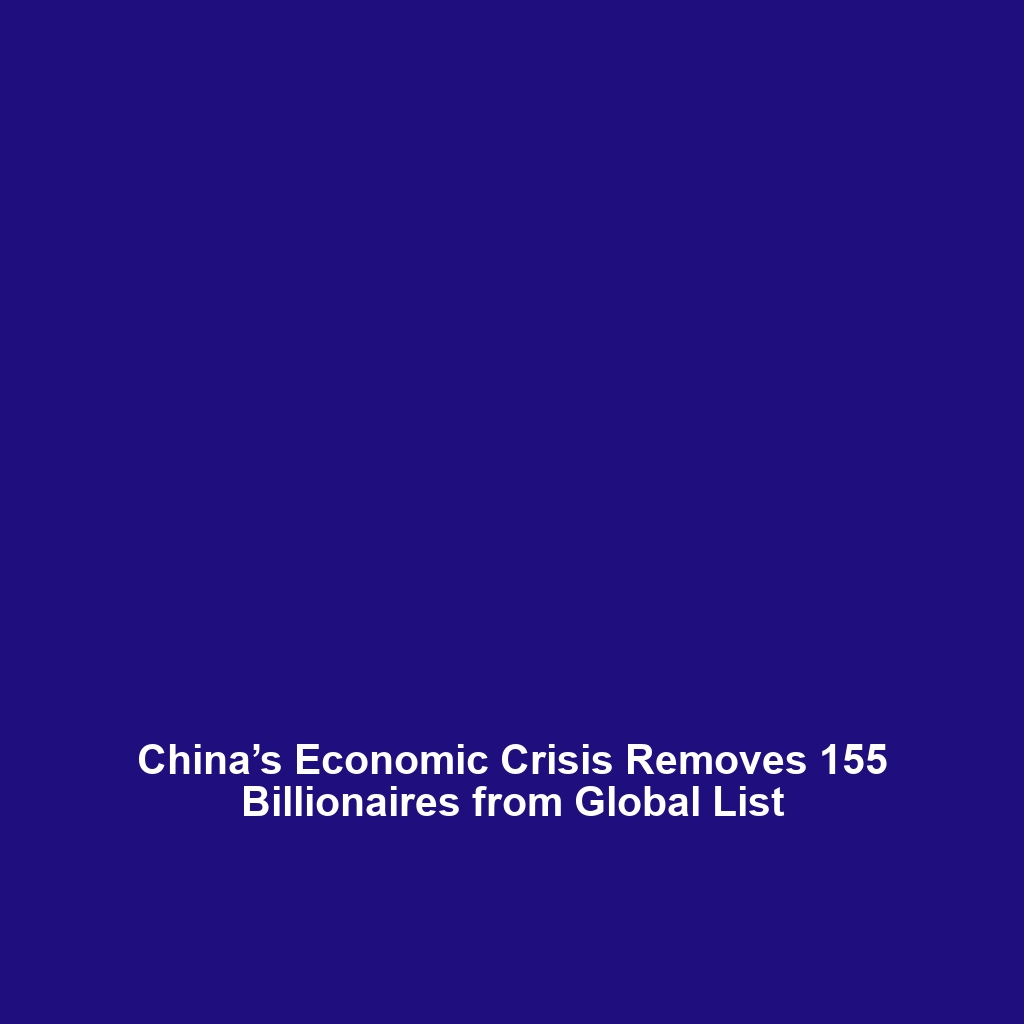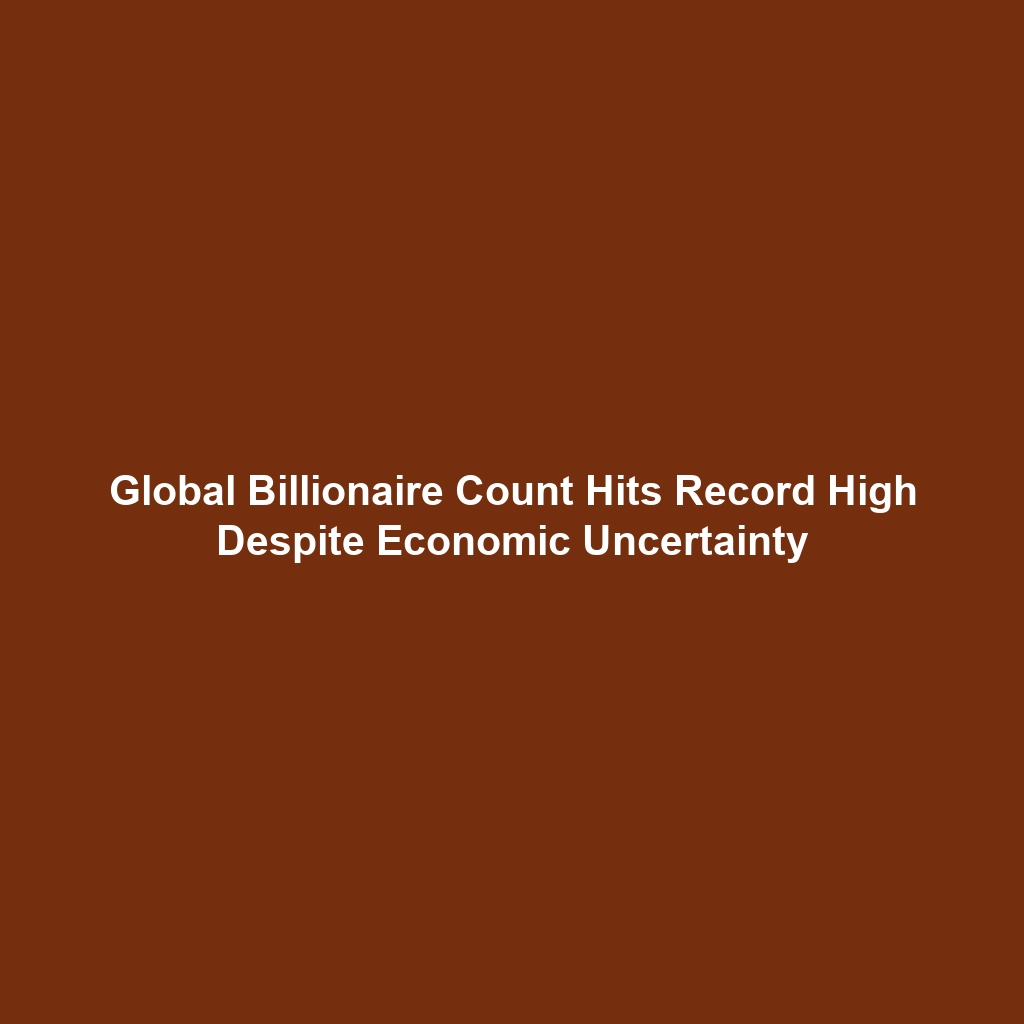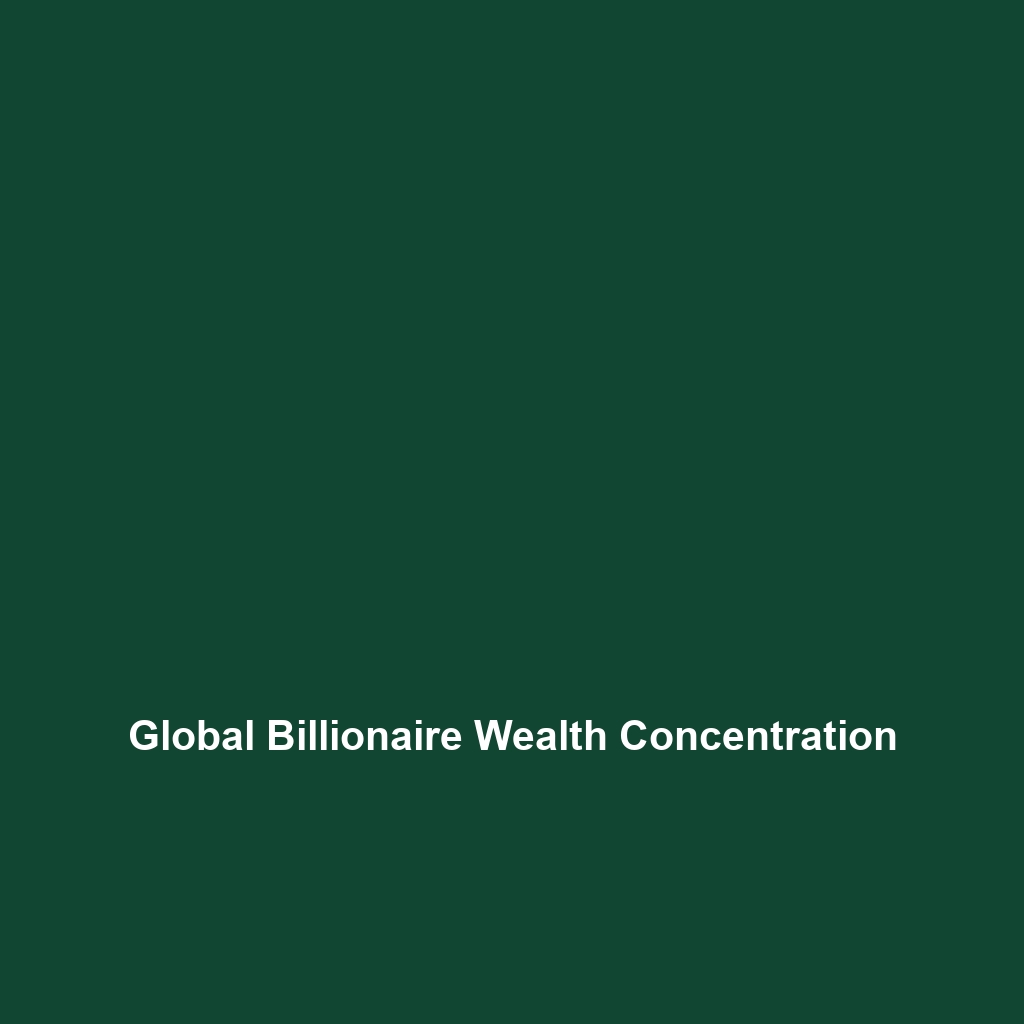Your cart is currently empty!
Tag: wealth redistribution

Increase in Global Billionaire Population
Increase in Global Billionaire Population
Increase in Global Billionaire Population
The billionaire population worldwide grew by 4% in 2023, reaching a staggering $12.1 trillion in collective wealth, according to the latest report from Swiss bank Credit Suisse. This increase comes amid ongoing economic challenges and uncertainties that have affected many sectors globally.
Global Economic Landscape
The rise in billionaire wealth occurs against a backdrop of fluctuating economic indicators. Despite persistent inflation, supply chain disruptions, and geopolitical tensions—particularly the ongoing conflict in Ukraine and various trade tensions—the ultra-wealthy have managed to increase their fortunes significantly.
Credit Suisse notes that the wealth of billionaires has grown substantially in key sectors such as technology, finance, and consumer goods. For instance, the technology sector, which has historically contributed the most to billionaire wealth, continues to thrive despite economic headwinds. Major players like Elon Musk and Jeff Bezos have seen their fortunes rebound as stock prices for tech companies recoup losses from previous declines.
Factors Driving Wealth Growth
Several factors have contributed to the increase in billionaires and their wealth in 2023. One significant element is the resilience of stock markets. After a challenging period, equities have regained momentum, benefitting many billionaires whose wealth is tied to publicly traded companies.
Moreover, the real estate market has rebounded in many regions, with high net worth individuals investing heavily in luxury properties, further adding to their wealth. The demand for high-end real estate remains strong, particularly in urban centers and popular destinations, where limited supply continues to drive prices up.
Additionally, the rise of innovation and entrepreneurship has fostered an environment where new billionaires emerge. Industries focusing on artificial intelligence, renewable energy, and biotechnology are expanding swiftly, leading to the creation of significant wealth.
Regional Highlights of Billionaire Wealth
Regionally, the dynamics of billionaire wealth distribution present a mixed picture. According to the report, North America leads in billionaire numbers, with the U.S. home to the highest concentration of ultra-wealthy individuals. This year, U.S. billionaires experienced a collective wealth increase of approximately 6%, driven primarily by recovery in tech stocks and strong consumer spending.
Meanwhile, Asia has also shown growth in its billionaire population. China, despite facing economic slowerdowns and adverse regulatory changes, added several billionaires to its roster, particularly in the technology and manufacturing sectors. This growth reflects the post-COVID economic recovery and the ongoing demand for technology solutions.
Challenges and Criticism
The increase in billionaire wealth raises questions about economic inequality and the distribution of resources amidst global economic hardship. Critics argue that the burgeoning wealth of billionaires highlights systemic issues regarding income inequality, with many individuals and families seeing stagnant wages and decreased purchasing power.
Economic analysts have pointed out that while a small fraction of the population accumulates tremendous wealth, the majority of the world continues to struggle with basic economic needs. Influential voices, including economists and social activists, have called for tax reforms and more equitable economic policies that could address these disparities.
Expert Opinions
To further evaluate the implications of this growth, financial analyst Dr. Emily Chen_comments: “The increase in billionaire wealth is both an indicator of market recovery and a reminder of the widening wealth gap. While the stock market and technological advancements favor the wealthy, policy solutions must be implemented to ensure that broader sections of society benefit from economic growth.”
Similarly, Professor Mark Harrison of the Economic Policy Institute asserts, “It’s crucial to evaluate the policies that permit this kind of wealth accumulation. A debate about billionaire taxes and wealth redistribution is necessary now more than ever, especially in light of the economic challenges affecting so many.”
Conclusion
In conclusion, the global billionaire population’s growth in 2023, marked by a 4% increase and a total wealth of $12.1 trillion, underscores the complex interplay between wealth generation and economic conditions. As billionaires thrive, the conversations surrounding wealth disparity and the need for equitable economic solutions are likely to escalate.
Future discussions will need to consider how society can address these disparities while encouraging economic innovation and growth that benefits a broader context. As the world faces ongoing economic strains, attention towards effective taxation and fair policies will be crucial in shaping future economic landscapes.

China’s Economic Crisis Removes 155 Billionaires from Global List
China’s Economic Crisis Removes 155 Billionaires from Global List
China’s Economic Crisis Removes 155 Billionaires from Global List
In a significant shift in the global wealth landscape, China’s ongoing economic downturn has led to the removal of 155 billionaires from the billionaires’ list compiled by Forbes in 2023. This decline is largely attributed to a series of economic challenges, including a surge in COVID-19 infections, a struggling real estate sector, and persistent inflationary pressures. As a result, the country’s billionaire count has reached its lowest level in nearly a decade.
Economic Context of the Billionaire Exodus
The removal of 155 billionaires reflects profound changes within China’s economy. According to Forbes, the total number of billionaires in China fell to 1,000, with the collective wealth of these individuals shrinking by $660 billion. Factors contributing to this decline include a prolonged slowdown in economic growth, which has fallen to its lowest rate in over three decades, coupled with external pressures such as rising interest rates and geopolitical tensions.
Impact on Key Industries
The impact of the economic crisis has been particularly severe in several key industries that historically generated significant wealth for entrepreneurs. The real estate sector, a staple of wealth accumulation for many billionaires, has been plagued by defaulting developers and declining property prices. Notably, real estate tycoon Hui Ka Yan, the founder of China Evergrande Group, saw his net worth plummet significantly, resulting in his departure from the billionaire rankings.
Moreover, technology giants have also faced scrutiny, with government regulations intensifying against large tech companies. This has directly affected prominent figures such as Jack Ma, the founder of Alibaba, who has faced challenges from government oversight that has impacted the company’s valuation.
Reactions from Financial Analysts
Financial analysts are closely observing these shifts, with many predicting that the decline in billionaire numbers could have far-reaching consequences for investment and economic recovery in China. Shang-Jin Wei, a professor at Columbia University and former chief economist of the Asian Development Bank, stated, “The loss of wealth among billionaires is reflective of broader economic pressures that could hinder investor confidence both domestically and internationally.”
Wei emphasized that the volatility in wealthy circles could signal a potential reduction in consumer spending and investment in China, which is crucial for economic rebound. As billionaires typically reinvest a significant portion of their wealth, their reduction in status may translate into decreased economic dynamism.
The Global Perspective on Wealth Redistribution
Globally, the reshuffling of China’s billionaire list signifies a broader trend toward wealth redistribution. As wealth concentration diminishes among elite classes in China, countries like the United States have seen an increase in their billionaire counts. For instance, Forbes reported that the United States added 36 billionaires to its list this year, highlighting the stark contrast in economic recoveries.
This international disparity may influence global investment patterns, prompting wealthier individuals to explore opportunities in markets perceived as more stable or favorable for growth. According to recent reports by Credit Suisse, the overall global wealth distribution continues to tilt towards developed nations, raising questions about the sustainability and long-term impact of these economic shifts.
Looking Ahead: What This Means for the Future
As China’s government grapples with these economic challenges, the path forward remains uncertain. Analysts suggest that structural reforms will be essential to restore confidence in the economy and curb the ongoing crisis. A key focus will likely be on regulations that support private enterprise while balancing state oversight to prevent market excesses.
Moreover, amidst the crisis, there are calls from economists like Michael Pettis, a finance professor at Peking University, for more sustainable growth strategies. “China needs to pivot towards domestic consumption and innovation rather than relying on property and investment-driven growth,” Pettis stated.
Conclusion
In summary, the removal of 155 billionaires from China’s wealth rankings not only highlights the depth of the nation’s economic challenges but also serves as a microcosm of the global shifts in wealth and investment patterns. As China strives to regain its economic footing, the implications of this billionaire exodus will likely resonate across markets and economies worldwide. Stakeholders will be keen to monitor how this evolving narrative affects both domestic and global economic prospects in the years to come.
For further reading on this topic, you may wish to explore additional articles on economic recovery strategies in China and the impact of wealth concentration on global economies.

Global Billionaire Count Hits Record High Despite Economic Uncertainty
Global Billionaire Count Hits Record High Despite Economic Uncertainty
Global Billionaire Count Hits Record High Despite Economic Uncertainty
The number of billionaires worldwide has reached an all-time high, with a record 2,640 individuals now qualifying for this elite financial status. This unprecedented surge in wealth accumulation occurs amidst widespread economic uncertainty and challenges triggered by the COVID-19 pandemic, geopolitical tensions, and inflationary pressures.
Wealth Distribution and Concentration
According to data released by Forbes, the global billionaire count has increased significantly in recent years, reflecting a trend of extreme wealth concentration. In 2023 alone, the combined net worth of the world’s billionaires rose to $12.2 trillion, marking an increase of $2 trillion from the previous year. This phenomenon raises important questions about income inequality and the socio-economic implications of such concentrated wealth.
A substantial portion of this wealth is concentrated in the technology and finance sectors, with figures indicating that at least 50% of the world’s billionaires derive their fortunes from these industries. Experts argue that advancements in technology and digital finance have accelerated wealth creation, even as many individuals and families continue to struggle economically.
Regional Insights
The United States continues to lead in billionaire wealth, hosting 735 individuals with a total net worth exceeding $4.5 trillion. The increase in American billionaires is often attributed to the booming stock market and the rapid growth of tech companies during the pandemic. Notably, business magnates such as Elon Musk and Jeff Bezos frequently highlight the impact of innovation on wealth generation.
In contrast, billionaire growth in regions like Asia has been marked by the sharp rise of entrepreneurs in emerging markets. For example, India has seen a surge in billionaires with a record of 169 individuals in 2023, supported by budding sectors like e-commerce and renewable energy. This shift demonstrates the changing landscape of global wealth as highlighted by economist Dr. Linda Zhang, who states, “Emerging markets are becoming increasingly significant players in the world economy, creating opportunities for wealth generation that were previously unavailable.”
Challenges and Criticisms
Despite the growth in billionaires, the global economy faces significant challenges. Inflation rates have surged, impacting households and driving up the cost of living in many regions. This economic uncertainty raises concerns about the implications of wealth concentration. Critics argue that billionaires wield unprecedented influence over political and economic systems, exacerbating income inequality where the wealth gap continues to widen.
In response, calls for higher taxation on the ultra-wealthy have intensified, particularly in regions where income inequality is glaringly visible. Advocates for wealth redistribution argue that billionaires should contribute more significantly to social programs aimed at alleviating poverty and enhancing public services. “The concentration of wealth at the top is unsustainable, and policy frameworks need to evolve in response to these discrepancies,” says social policy analyst Dr. Maria Thompson.
The Role of Philanthropy
Philanthropy has emerged as a mechanism through which billionaires address some of the pressing global issues they are increasingly criticized for. Wealthy individuals and foundations have contributed billions to various causes, including education, health, and environmental initiatives. However, the effectiveness of philanthropy as a solution to broader structural problems remains controversial.
Many argue that while philanthropy can offer temporary relief, it does not replace the need for comprehensive policy changes that address the root causes of poverty and inequality. “We must be cautious of viewing philanthropy as a panacea; it cannot substitute for systemic solutions,” remarks Dr. Jonathan Reed, an expert in public policy.
Future Outlook
The unprecedented rise in billionaires poses both opportunities and challenges as the world navigates through economic turbulence. While innovative sectors continue to generate wealth, addressing the inherent issues surrounding wealth concentration is imperative to ensure a more inclusive economic landscape. Industry analysts project that the trend of increasing billionaire counts will likely continue in the near term but underscore the necessity for policy interventions aimed at fostering equitable wealth distribution.
In conclusion, the record high in the global billionaire count amidst economic uncertainty highlights a pivotal moment in wealth distribution. As wealth continues to concentrate among a small percentage of the population, the urgency for discussions regarding equitable economic policies and practices grows stronger. Moving forward, collaboration among governments, institutions, and the private sector will be vital in creating a more balanced economic future.
